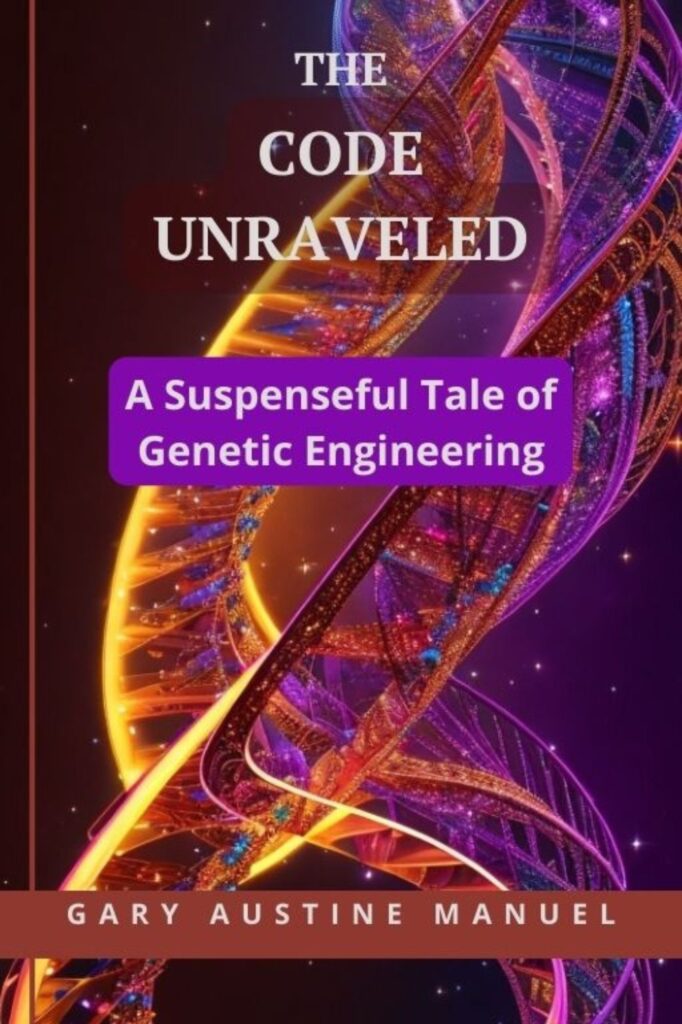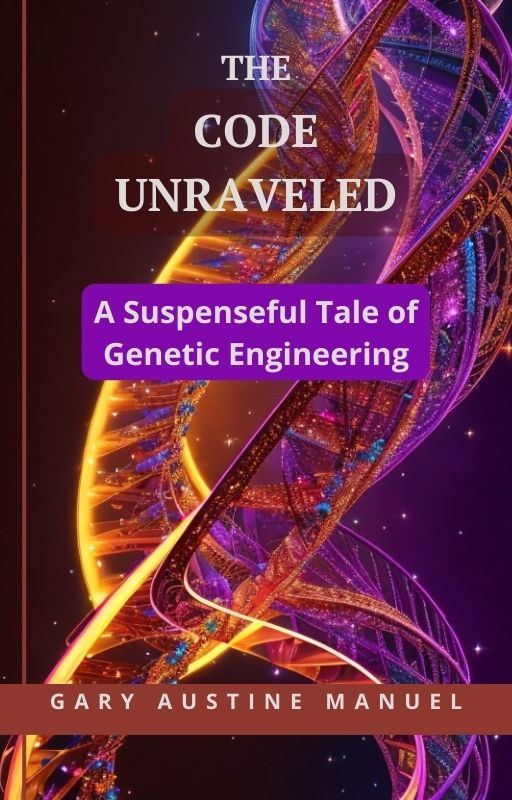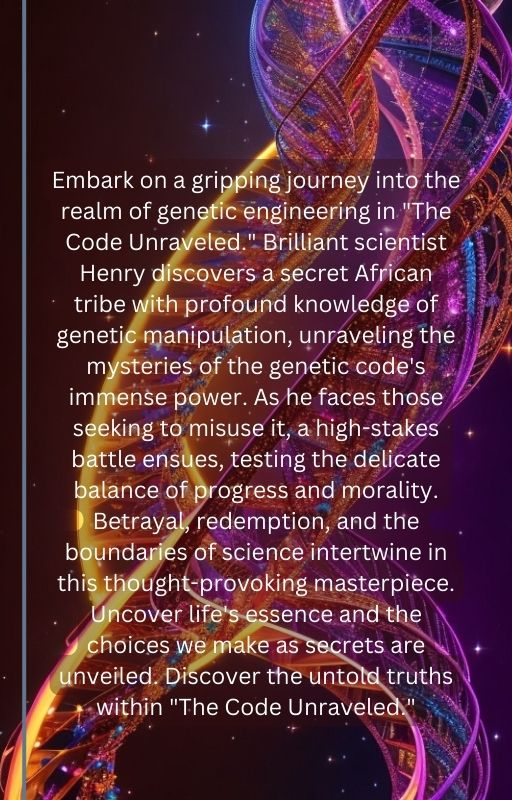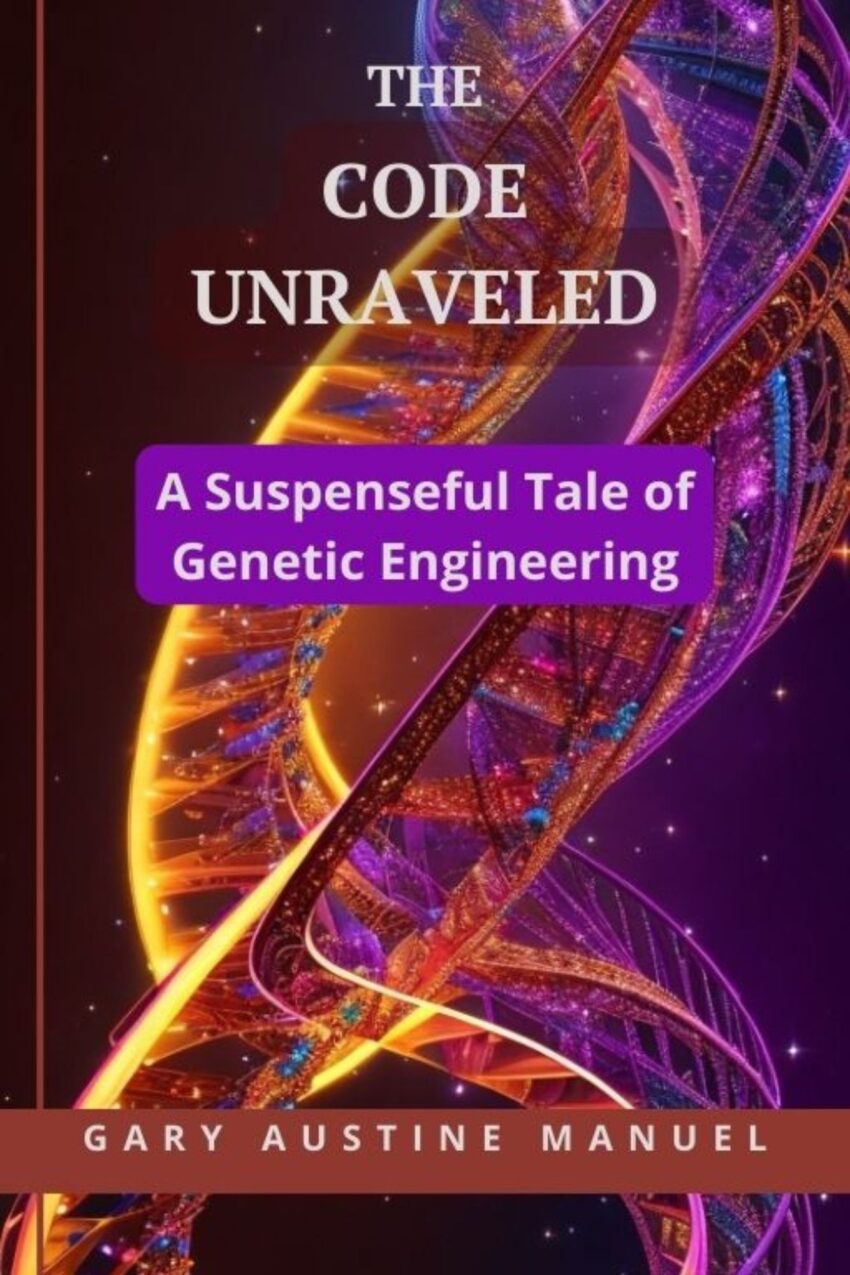
Introduction
In a world where science and ethics collide, genetic engineering stands at the forefront of human ingenuity. In the gripping novel ‘The Code Unraveled,’ readers are taken on a thrilling journey that explores the profound implications of this fascinating field. Join us as we delve into the intricate world of genetic engineering and uncover the secrets that lie within its pages.
The Fascinating World of Genetic Engineering
Genetic engineering is a revolutionary scientific discipline that involves manipulating the genetic makeup of living organisms. From genetically modified crops to groundbreaking medical advancements, this field has the power to shape our future. In ‘The Code Unraveled,’ author Gary Austine Manuel immerses readers in a world where the boundaries of science and morality are tested.

The Plot of ‘The Code Unraveled
At the heart of the story is Henry, a brilliant scientist who stumbles upon a secret African tribe with unparalleled knowledge of genetic manipulation. As Henry delves deeper into their wisdom, he unlocks the mysteries of the genetic code, discovering its immense power and potential. However, with great power comes great responsibility, and Henry must navigate a treacherous path filled with moral dilemmas and life-altering choices.
See also: https://sites.google.com/view/code-unraveled/home
Exploring the Ethical Dilemmas
In ‘The Code Unraveled,’ the author deftly explores the ethical implications of genetic engineering. Henry grapples with the delicate balance between scientific progress and moral responsibility, as he faces off against those seeking to misuse the power of genetic manipulation. Betrayal and redemption, trust and deceit, intertwine in a gripping narrative that forces readers to question their own beliefs and confront the consequences of tampering with nature.
The Resilience of the Human Spirit
Amidst the challenges and perils, ‘The Code Unraveled’ showcases the resilience of the human spirit. Henry’s journey towards redemption serves as a powerful reminder of the strength we possess when faced with adversity. Through his experiences, readers witness the transformative power of introspection and the capacity for growth and change.

See also 5 Reasons Why Holiday Word Quest Puzzles Will Boost Your Brainpower!
The Takeaway from ‘The Code Unraveled
As you turn the pages of ‘The Code Unraveled,’ you will be captivated by its thought-provoking themes and profound insights. The book pushes the boundaries of scientific exploration while inviting readers to contemplate the ethical dilemmas posed by genetic engineering. It serves as a reminder that as we unravel the secrets of nature, we must navigate the intricate web of responsibility and accountability.
Conclusion
In the world of genetic engineering, where hidden agendas and profound consequences collide, ‘The Code Unraveled‘ offers a gripping and suspenseful exploration of the moral and ethical implications of tampering with the code of life. If you are ready to embark on a thrilling journey that challenges your perceptions and ignites your imagination, pick up ‘The Code Unraveled‘ and discover the untold truths that lie within its pages.
Unleash your curiosity and dive into the captivating world of ‘The Code Unraveled’ on Amazon. Get your copy of ‘The Code Unraveled‘ now and embark on a thought-provoking journey into the realm of genetic engineering: https://www.amazon.com/Code-Unraveled-Suspenseful-Genetic-Engineering-ebook/dp/B0C72W4863/
About the Author
Gary Austine Manuel is a multifaceted and highly educated individual with a diverse range of skills and expertise. He holds multiple degrees in the arts, law, social sciences, and humanities, including LLB Hons in Law, a BA Hons in Creative and Performing Arts, a Dip Mus Ed in Music Education, a Pdip Bus Admin in Business Administration, a PDip Estate Mgt in Estate Management, an MBA in Business Administration, and an MSC in Peace and Conflict Resolution. In addition to his impressive educational background, Gary is also a Chartered Arbitrator and Mediator trained by the Chartered Institute of Arbitrators UK, ICMC and several others. He has published numerous books, including “Loving Beyond Borders” “Rise and Shine: The Path to Success” “Self Love Blueprint: Transform Yourself” “Tragedy of Forbidden Love” “The Secret Life Of Miss Jane” and “Switched at Birth: A Heartbreaking Mistake”
All can be found on Amazon.com. Gary writes blogs largely here: https://www.affiliate-marketing.com.ng/
Unleashing the Power Within: Sci-Fi Genetic Engineering
Unleashing the Power Within: Sci-Fi Genetic Engineering
Genetic engineering has long been a popular theme in science fiction literature, thanks in part to its unlimited possibilities. These stories often take readers on a journey exploring the potential of unleashing the power within through genetic manipulation. From unlocking hidden abilities to accelerating human evolution, the concept of genetic engineering in science fiction has captivated audiences for decades.
The Fascinating World of Genetic Engineering in Sci-Fi
Genetic engineering has been a popular theme in science fiction literature, captivating readers with its unlimited possibilities. The concept of manipulating genes to unleash the power within has allowed authors to push the boundaries of imagination and explore new frontiers.
Science fiction writers have delved into genetic engineering with enthusiasm, creating unique worlds and societies where genetic manipulation is commonplace. Through these narratives, readers can explore the limitless possibilities of genetic engineering and its impact on humanity.

See also 5 Reasons Why Holiday Word Quest Puzzles Will Boost Your Brainpower!
The Fascinating World of Genetic Engineering in Sci-Fi
The captivating nature of genetic engineering in science fiction is clear. It allows authors to imagine a future where humans can be enhanced beyond their natural abilities, unlocking their full potential. Stories explore how genetic enhancements can improve physical strength, mental capacity, and even create superhuman abilities.
But the fascination with genetic engineering in science fiction goes beyond the potential for self-improvement. It also explores the ethical dilemmas and moral issues that arise from manipulating the very foundations of life.
Science fiction literature has often used genetic engineering as a cautionary tale, warning of the potential dangers of playing god with the building blocks of life. In these stories, manipulations have led to catastrophe, creating horrific creatures and dystopian societies.
The world of genetic engineering in science fiction is fascinating, and authors have used the theme to create works that explore the limits of human potential and the consequences of playing with nature.
See also Exploring the Possibilities of Genetic Code Manipulation Through Science Fiction
Exploring Genetic Engineering Possibilities
Genetic engineering is the epitome of “unleashing the power within” in science fiction literature. The possibilities offered by genetic manipulation are truly unlimited, allowing authors to push the boundaries of imagination and explore new frontiers of storytelling.
From creating genetically enhanced super-soldiers to engineering entire new species, genetic engineering in science fiction literature offers a vast canvas for authors to create captivating and thought-provoking worlds.
One popular theme in science fiction genetic engineering is the idea of unlocking one’s full potential. Characters can be imbued with extraordinary abilities and powers through genetic enhancements, allowing them to overcome seemingly insurmountable challenges and achieve incredible feats.
But the possibilities of genetic engineering in science fiction are not limited to just individual characters. It also offers a way to explore the societal implications of genetic manipulation. In some stories, genetic engineering has led to the establishment of new social classes where genetically enhanced individuals hold a dominant position in society.
Moreover, genetic engineering in science fiction literature raises important ethical questions. Is it right to manipulate the genetic makeup of living creatures? What are the long-term consequences of such actions?
These questions are often explored in science fiction literature, providing a platform for thought-provoking discussions on the morality of genetic engineering and its potential impact on society.
See alsoAFFILIATE TECHNIQUE
Unleashing Power Within: Genetic Enhancements in Sci-Fi
Genetic enhancements in science fiction literature explore the potential for individuals to unlock their full potential through genetic manipulation. These enhancements allow characters to enhance their physical, mental and emotional attributes, making them stronger, smarter and more resilient.
The idea of unlocking power within through genetic manipulation has captured the imaginations of science fiction authors and readers alike. It allows for limitless possibilities and opens up new avenues for storytelling. In sci-fi literature, genetic enhancements are often portrayed as a quick fix to overcome personal obstacles and gain a competitive edge over others.
| Examples of Genetic Enhancements in Sci-Fi: | Description: |
|---|---|
| Spice Melange from Dune | A drug that enhances mental and physical abilities, granting users psychic powers and increased longevity. |
| Biotics from Mass Effect | Biotics are people with genetically enhanced abilities to manipulate dark energy and create powerful biotic abilities like telekinesis and energy blasts. |
| Super Soldier Serum from Captain America | A serum that turns Steve Rogers into Captain America, enhancing his physical abilities beyond those of a normal human, and giving him near-perfect health and endurance. |
However, the theme of genetic enhancements in science fiction is not always positive. It also highlights the potential dangers of tampering with the building blocks of life. Characters often face the consequences of genetic experimentation, such as physical mutations, psychological deterioration, and loss of free will.
Overall, genetic enhancements in science fiction literature offer a fascinating look at the possibilities and perils of manipulating genetics. It prompts readers to question the ethics of genetic manipulation and consider the potential consequences of playing with nature.

Ethical Dilemmas in Sci-Fi Genetic Engineering
While science fiction literature presents genetic engineering as a tool for unlocking unlimited possibilities, it also raises ethical dilemmas about the consequences of manipulating genetics. Characters often face moral decisions that challenge their personal values and beliefs.
For example, in the classic sci-fi novel “Brave New World” by Aldous Huxley, society is genetically engineered for strict conformity and stability, leading to the suppression of individuality and free will. The novel questions whether the loss of freedom is worth the price of a seemingly perfect society.
Similarly, in the film “Gattaca,” genetic discrimination is rampant, with genetically-engineered humans holding privileged positions while “natural-borns” are relegated to menial jobs. The movie raises concerns about the ethical implications of designing humans to be superior and the division it creates in society.
Is genetic engineering in sci-fi always portrayed as negative?
Not always. In some stories, genetic engineering is presented as a solution to societal problems, such as curing diseases or enhancing physical abilities. However, these stories often still raise ethical questions about the consequences of manipulating biology.
For example, in the novella “Beggars in Spain” by Nancy Kress, genetic engineering allows people to experience sleeplessness, leading to increased productivity and success. However, the story also examines the divide between those who can afford genetic enhancements and those who cannot, and the societal implications of creating a new class of genetically superior individuals.
Overall, genetic engineering in sci-fi literature serves as a cautionary tale about the potential power and consequences of manipulating biology, and prompts readers to consider the ethical implications of such technology.
The Impact of Genetic Engineering on Society in Sci-Fi
Genetic engineering in science fiction has far-reaching consequences that extend beyond the individual level. Society as a whole is impacted by the use and abuse of genetic modifications, as explored in various texts. Science fiction literature allows readers to consider the implications of genetic engineering and what it means for the future of humanity.
The Societal Implications of Genetic Engineering in Science Fiction
In science fiction literature, genetic engineering has the power to redefine societal norms and values. In Brave New World by Aldous Huxley, society is divided into castes based on genetic modification. This creates a dystopian society where individuals are predetermined to fulfill specific roles based on their genetic makeup. This raises questions about the ethics of creating a class-based society determined by genetics.
Similarly, genetic engineering in Gattaca by Andrew Niccol is used to determine an individual’s social status and employment opportunities. This creates a system that values genetic perfection, leaving those without modifications at a disadvantage. This portrayal in science fiction raises concerns about the potential for discrimination based on genetic makeup in real-life societies.
The Impact of Genetic Engineering on Personal Identity and Relationships
Genetic engineering also has implications for personal identity and human relationships in science fiction literature. In Do Androids Dream of Electric Sheep? by Philip K. Dick, genetic engineering is used to create artificial humans who are physically and mentally superior to natural humans. This creates a divide between the two groups, leading to a loss of empathy and a devaluation of natural human life. The novel forces readers to consider what it means to be human and the importance of empathy.
Genetic engineering also impacts relationships in science fiction. In Never Let Me Go by Kazuo Ishiguro, genetically modified humans are created solely to become organ donors for natural humans. This creates a society where individuals are seen as disposable and valued only for their organs. The novel raises questions about the value of human life and the importance of relationships.
The Role of Government and Ethics in Genetic Engineering
The role of government in regulating genetic engineering is a common theme in science fiction literature. In The Children of Men by P.D. James, the government controls reproduction and genetic modification in an attempt to fix a global infertility crisis. This raises concerns about the ethics of government control over personal reproduction.
The ethical implications of genetic engineering are further explored in Jurassic Park by Michael Crichton. In the novel, scientists genetically engineer dinosaurs for a theme park, but their lack of ethical oversight leads to disastrous consequences. This serves as a warning about the dangers of unchecked genetic engineering and the importance of ethical considerations.
Conclusion
Genetic engineering in science fiction has a profound impact on society and raises important ethical and moral questions. Science fiction literature allows us to explore the consequences of genetic modification and its effects on the individual, relationships, and society as a whole. By considering the implications of genetic engineering in science fiction, we can better understand the importance of ethical considerations and the potential impact of this technology on our future.
Genetic Engineering and Human Evolution in Sci-Fi
One of the most fascinating aspects of genetic engineering in science fiction literature is the idea that it can accelerate human evolution. By creating genetic enhancements that improve physical or cognitive abilities, characters can unlock their full potential and become something beyond human. This concept raises interesting questions about what it means to be human and what our limitations are.
In some sci-fi stories, genetic engineering is used to create a new breed of humans with enhanced abilities. These characters are often portrayed as superior beings, with heightened senses, intelligence, and physical capabilities. They may have telekinetic powers, super strength, or the ability to read minds. These enhancements allow them to accomplish feats that would be impossible for ordinary humans.
In other stories, genetic engineering is used to explore the consequences of tampering with nature. Characters may develop monstrous or dangerous powers that they struggle to control, or they may suffer from unforeseen side effects of genetic modification. These cautionary tales serve as a reminder that there are limits to what we should do in the pursuit of scientific advancement.
The idea of genetic engineering accelerating human evolution also has real-world implications. Some scientists believe that we may one day be able to use genetic engineering to cure diseases, enhance our physical and mental abilities, and even extend our lifespans. While we are still far from realizing these possibilities, the science fiction literature exploring these ideas can inspire further research and technological advancements.
Exploring the Possibilities of Genetic Code Manipulation Through Science Fiction
Examples of Genetic Engineering and Human Evolution in Sci-Fi
| Sci-Fi Story | Description |
|---|---|
| X-Men | The X-Men comics and movies explore a world where humans coexist with mutants who have evolved beyond normal human abilities. Genetic mutations give these characters superpowers, and the story explores the conflict between mutants and non-mutants. |
| Brave New World | This classic sci-fi novel by Aldous Huxley imagines a society where people are genetically engineered to fit into specific social classes. The story raises questions about the ethics of genetic engineering and the consequences of creating a society where people are genetically predetermined to fulfill specific roles. |
| Gattaca | This 1997 film depicts a future where genetic engineering has become so advanced that children are genetically engineered to have specific traits. The story follows a man who was born without genetic enhancements as he tries to achieve his dream of going to space. |
These examples show just a few of the many ways that genetic engineering and human evolution are explored in science fiction. Whether it is used to create superhumans, warn of the dangers of playing God, or inspire scientific research, genetic engineering has proven to be a compelling theme in sci-fi literature.
Genetic Engineering Gone Wrong: Sci-Fi Nightmares
While the potential benefits of genetic engineering in science fiction are vast, there are also cautionary tales of genetic experiments gone wrong. From creating monstrous creatures to unintended consequences, science fiction literature explores the dark side of tinkering with genetics.
One example of genetic engineering gone wrong is the novel “Jurassic Park” by Michael Crichton. In the novel, geneticists create dinosaurs through genetic engineering, but the dinosaurs inevitably escape and wreak havoc on the island. The story highlights the dangers of playing god with genetics and the unforeseen consequences that can arise.
Another example is the film “Splice,” in which genetic engineers create a hybrid creature that quickly turns out to be uncontrollable and dangerous. The film raises ethical questions about the limits of genetic engineering and the responsibility of scientists to the creations they make.
“Just because we can do something doesn’t mean we should.”
These cautionary tales serve as a reminder that while genetic engineering may hold tremendous potential for unlocking the power within, there must also be a balance between science and morality. The consequences of genetic experimentation in science fiction serve as a warning that we must proceed with caution when it comes to manipulating the building blocks of life.
The Influence of Genetic Engineering in Real-Life Science
Science fiction has always been a source of inspiration for scientific research and advancements. The portrayal of genetic engineering in sci-fi has also had a significant impact on real-life genetic research.
One example is the concept of gene editing, which was popularized in the novel Brave New World by Aldous Huxley. The novel inspired the development of CRISPR-Cas9 gene editing technology, which allows scientists to make precise changes to specific genes.
Similarly, the idea of genetic enhancement, as explored in sci-fi literature, has sparked research into using genetic engineering to improve human performance and abilities. For instance, a study found that a gene called VEGF could enhance endurance performance in mice, leading to speculation that gene editing could one day be used to enhance human athletic performance.
However, the portrayal of genetic engineering in sci-fi is not always accurate or ethical, and it is important to consider the potential consequences of genetic manipulation. The use of genetic engineering to create “designer babies,” for instance, raises serious ethical concerns about genetic discrimination and inequality.
Overall, while sci-fi portrayals of genetic engineering are often fantastical and far-fetched, they can also inspire real-life scientific research and advancements. As genetic research continues to advance, it is important to consider the ethical implications and potential consequences of genetic engineering.
Unleashing Your Potential: Tips from Sci-Fi Genetic Engineering
While genetic engineering in science fiction may seem far-fetched, the concept of unlocking the power within oneself is a universal theme that resonates with readers. Here are some practical tips inspired by science fiction genetic engineering for individuals looking to unleash their own potential:
- Embrace your uniqueness: In many science fiction stories, genetic enhancements are used to create superhumans with extraordinary abilities. However, it’s important to remember that each person has their own unique strengths and weaknesses. Embrace what makes you different and use it to your advantage.
- Set goals: In science fiction, genetic engineering is often used to achieve specific goals, such as enhanced intelligence or physical strength. Similarly, setting specific goals for yourself can help you focus your efforts and make progress towards your desired outcome.
- Continuously learn: In science fiction, genetic engineering is often used to enhance intelligence and knowledge. Whether it’s through reading, taking classes, or trying new things, make a conscious effort to continuously learn and expand your knowledge base.
- Take care of your body: In science fiction, genetic enhancements are often used to improve physical strength and endurance. While genetic engineering may not be a reality yet, taking care of your body through exercise, proper nutrition, and rest can help you perform at your best.
- Believe in yourself: In science fiction, characters often struggle to unlock their full potential due to self-doubt or fear of failure. Remember to have confidence in yourself and believe that you have the ability to achieve great things.
By applying these tips and embracing the spirit of genetic engineering in science fiction, you can unlock your own potential and unleash the power within.
FAQ: Frequently Asked Questions about Genetic Engineering in Sci-Fi
Below are some common questions about genetic engineering in science fiction:
What is genetic engineering?
Genetic engineering involves manipulating an organism’s DNA to create desired traits or characteristics.
Why is genetic engineering a popular theme in science fiction?
Genetic engineering is a popular theme in science fiction because it allows authors to explore the potential of unleashing the power within through genetic manipulation. It also raises ethical questions and prompts readers to consider the implications of altering genes.
What are some examples of genetic engineering in science fiction?
Some examples of genetic engineering in science fiction include the genetically enhanced soldiers in the book series “Halo,” the genetically engineered dinosaurs in “Jurassic Park,” and the genetically altered humans in the film “Gattaca.”
What are some of the ethical dilemmas raised by genetic engineering in science fiction?
Some ethical dilemmas raised by genetic engineering in science fiction include the potential for creating a genetically superior class of humans, the potential for discrimination against those who have not been genetically altered, and the potential for unintended consequences and unforeseen negative effects on the environment or society.
What impact has science fiction had on real-life genetic engineering research?
Science fiction portrayals of genetic engineering have inspired real-life scientific research and advancements, such as the development of genetically modified crops and the use of gene editing in medical treatments.
How can I unleash my own potential using tips inspired by sci-fi genetic engineering?
Some tips inspired by science fiction genetic engineering include setting specific goals for self-improvement, consistently challenging yourself to push beyond your limits, and embracing the power within yourself to achieve your full potential.
Hopefully, these answers have provided you with a better understanding of genetic engineering in science fiction.


Whats up very cool website!! Man .. Beautiful .. Superb
.. I will bookmark your site and take the feeds also?
I’m glad to find numerous useful info right here in the submit, we’d like develop more strategies on this regard, thanks for sharing.
. . . . .